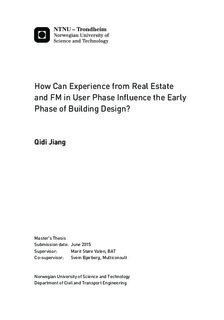How Can Experience from Real Estate and FM in User Phase Influence the Early Phase of Building Design?
Abstract
The practice of building design at large, focuses on the realization of physical features, which are based on different design philosophy and technical standards, creating spaces where different human behaviors are expected to take place. However, it should be noted, as people often forget, or sometimes intentionally neglect, that meeting the prerequisite will never guarantee an achieved goal, though failing to do so will absolutely undermine such goal. Quite often, there are buildings with excellent architectural design but with barely satisfactory user experience. The cause of such divided perception, is insufficient comprehension of the complexity in the interaction among users (also known as occupants) and between users and the building. Understanding the inner mechanism of the interaction between users and the building, and introduce such knowledge at the early phase of building design is believed to have great and positive influence over building design.
Some of the major findings of this thesis include: 1. Mistaking any strategic or tactical approach for sustainable design with the actual goal of achieving sustainability would be missing the point. And this problem is prominent in many of today's allegedly sustainable buildings with certified energy level. 2. Users' inconsistent attitude towards sustainable building is reflected in the fact that most of them do appreciate having sustainable features in a building - only if this doesn't contradict the comfort of their energy-consuming life style. 3. Users can help accomplish a genuinely sustainable building project even under unfavorable condition (socially, economically, etc.) as long as they are motivated by a strategic design of the building which successfully align the building's function with the users' core interests.
